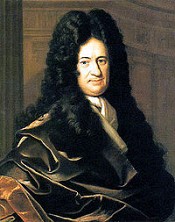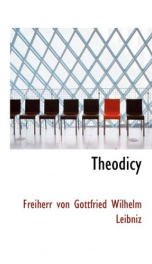Gottfried Wilhelm von Leibniz (German pronunciation: [ˈgɔtfrit ˈvɪlhɛlm fən ˈlaɪpnɪts]; also Leibnitz;[1] 1 July 1646 [OS: 21 June] – 14 November 1716) was a German philosopher, polymath and mathematician who wrote primarily in Latin and French. He occupies a grand place in both the history of philosophy and the history of mathematics. He invented infinitesimal calculus independently of Newton, and his notation has been in general use since then. He also invented the binary system, the foundation of virtually all modern computer architectures. In philosophy, he is mostly remembered for optimism, i.e. his conclusion that our universe is, in a restricted sense, the best possible one God could have made. He was, along with René Descartes and Baruch Spinoza, one of the three greatest 17th-century rationalists and anticipates modern logic and analysis, but his philosophy also looks back to the scholastic tradition, in which logic was an important part. Leibniz also made major contributions to physics and technology, and anticipated notions that surfaced much later in biology, medicine, geology, probability theory, psychology, linguistics, and information science. He also wrote on politics, law, ethics, theology, history, philosophy and philology, even occasional verse. His contributions to this vast array of subjects are scattered in journals and in tens of thousands of letters and unpublished manuscripts. As of 2009, there is no complete edition of Leibniz's writings.[2] Gottfried Leibniz was born on 1 July 1646 in Leipzig to Friedrich Leibniz and Catherina Schmuck. His father died when he was six, so he learned his religious and moral values from his mother. These would exert a profound influence on his philosophical thought in later life. As an adult, he often styled himself "von Leibniz", and many posthumous editions of his works gave his name on the title page as "Freiherr [Baron] G. W. von Leibniz." However, no document has been found confirming that he was ever granted a patent of nobility.[3] Upon the death of his father, a Professor of Moral Philosophy at the University of Leipzig, Leibniz was left with the father's personal library, to which he was granted free access from age seven onwards. While his schoolwork focused on a small canon of authorities, his father's library enabled him to study a wide variety of advanced philosophical and theological works that he would not have otherwise been able to read until his university studies. Access to his father's library accelerated his mastery of Latin. Leibniz was proficient by age 12, composing three hundred hexameters of Latin verse in a single morning for a school celebration at age 13. He entered his father's university at age 14 and completed a Bachelor's degree in philosophy on 2 December 1662. He defended his Disputatio Metaphysica de Principio Individui, which addressed the Principle of individuation, on 9 June 1663. He soon after took a Master's degree in philosophy on 7 February 1664. He published and defended a dissertation Specimen Quaestionum Philosophicarum ex Jure collectarum, arguing for both a theoretical and a pedagogical relationship between philosophy and law, in December 1664. After two years of legal studies, he was awarded a Bachelor's degree in law on 28 September 1665. In 1666 (age 20), he published his first book, On the Art of Combinations, the first part of which was also his habilitation thesis in philosophy. His next goal was to obtain a license and doctorate in law, which normally required three years of study. Older students blocked his early graduation plans, leading him to leave Leipzig in September 1666. He enrolled in the University of Altdorf and almost immediately submitted a thesis, which he had likely been writing earlier at Leipzig. The title of the thesis was Disputatio de Casibus perplexis in Jure. Leibniz obtained a license and doctorate in law in November of that year. He then declined an offer of academic appointment at Altdorf, and spent the rest of his life in the service of two major German noble families. Leibniz's first position was as a salaried alchemist in Nuremberg, even though he knew nothing about the subject. He soon met Johann Christian von Boineburg (1622–1672), the dismissed chief minister of the Elector of Mainz, Johann Philipp von Schönborn. Von Boineburg hired Leibniz as an assistant, and shortly thereafter reconciled with the Elector and introduced Leibniz to him. Leibniz then dedicated an essay on law to the Elector in the hope of obtaining employment. The stratagem worked; the Elector asked Leibniz to assist with the redrafting of the legal code for his Electorate. In 1669, Leibniz was appointed Assessor in the Court of Appeal. Although von Boineburg died late in 1672, Leibniz remained under the employment of his widow until she dismissed him in 1674. Von Boineburg did much to promote Leibniz's reputation, and the latter's memoranda and letters began to attract favorable notice. Leibniz's service to the Elector soon followed a diplomatic role. He published an essay, under the pseudonym of a fictitious Polish nobleman, arguing (unsuccessfully) for the German candidate for the Polish crown. The main European geopolitical reality during Leibniz's adult life was the ambition of Louis XIV of France, backed by French military and economic might. Meanwhile, the Thirty Years' War had left German-speaking Europe exhausted, fragmented, and economically backward. Leibniz proposed to protect German-speaking Europe by distracting Louis as follows. France would be invited to take Egypt as a stepping stone towards an eventual conquest of the Dutch East Indies. In return, France would agree to leave Germany and the Netherlands undisturbed. This plan obtained the Elector's cautious support. In 1672, the French government invited Leibniz to Paris for discussion, but the plan was soon overtaken by events and became irrelevant. Napoleon's failed invasion of Egypt in 1798 can be seen as an unwitting implementation of Leibniz's plan. Thus Leibniz began several years in Paris. Soon after arriving, he met Dutch physicist and mathematician Christiaan Huygens and realised that his own knowledge of mathematics and physics was spotty. With Huygens as mentor, he began a program of self-study that soon pushed him to making major contributions to both subjects, including inventing his version of the differential and integral calculus. He met Malebranche and Antoine Arnauld, the leading French philosophers of the day, and studied the writings of Descartes and Pascal, unpublished as well as published. He befriended a German mathematician, Ehrenfried Walther von Tschirnhaus; they corresponded for the rest of their lives. When it became clear that France would not implement its part of Leibniz's Egyptian plan, the Elector sent his nephew, escorted by Leibniz, on a related mission to the English government in London, early in 1673. There Leibniz came into acquaintance of Henry Oldenburg and John Collins. After demonstrating a calculating machine he had been designing and building since 1670 to the Royal Society , the first such machine that could execute all four basic arithmetical operations, the Society made him an external member. The mission ended abruptly when news reached it of the Elector's death, whereupon Leibniz promptly returned to Paris and not, as had been planned, to Mainz. The sudden deaths of Leibniz's two patrons in the same winter meant that Leibniz had to find a new basis for his career. In this regard, a 1669 invitation from the Duke of Brunswick to visit Hanover proved fateful. Leibniz declined the invitation, but began corresponding with the Duke in 1671. In 1673, the Duke offered him the post of Counsellor which Leibniz very reluctantly accepted two years later, only after it became clear that no employment in Paris, whose intellectual stimulation he relished, or with the Habsburg imperial court was forthcoming. Leibniz managed to delay his arrival in Hanover until the end of 1676, after making one more short journey to London, where he possibly was shown some of Newton's unpublished work on the calculus. This fact was deemed evidence supporting the accusation, made decades later, that he had stolen the calculus from Newton. On the journey from London to Hanover, Leibniz stopped in The Hague where he met Leeuwenhoek, the discoverer of microorganisms. He also spent several days in intense discussion with Spinoza, who had just completed his masterwork, the Ethics. Leibniz respected Spinoza's powerful intellect, but was dismayed by his conclusions that contradicted both Christian and Jewish orthodoxy. In 1677, he was promoted, at his request, to Privy Counselor of Justice, a post he held for the rest of his life. Leibniz served three consecutive rulers of the House of Brunswick as historian, political adviser, and most consequentially, as librarian of the ducal library. He thenceforth employed his pen on all the various political, historical, and theological matters involving the House of Brunswick; the resulting documents form a valuable part of the historical record for the period. Among the few people in north Germany to accept Leibniz were the Electress Sophia of Hanover (1630–1714), her daughter Sophia Charlotte of Hanover (1668–1705), the Queen of Prussia and her avowed disciple, and Caroline of Ansbach, the consort of her grandson, the future George II. To each of these women he was correspondent, adviser, and friend. In turn, they all approved of Leibniz more than did their spouses and the future king George I of Great Britain.[4] The population of Hanover was only about 10,000, and its provinciality eventually grated on Leibniz. Nevertheless, to be a major courtier to the House of Brunswick was quite an honor, especially in light of the meteoric rise in the prestige of that House during Leibniz's association with it. In 1692, the Duke of Brunswick became a hereditary Elector of the Holy Roman Empire. The British Act of Settlement 1701 designated the Electress Sophia and her descent as the royal family of the United Kingdom, once both King William III and his sister-in-law and successor, Queen Anne, were dead. Leibniz played a role in the initiatives and negotiations leading up to that Act, but not always an effective one. For example, something he published anonymously in England, thinking to promote the Brunswick cause, was formally censured by the British Parliament.









